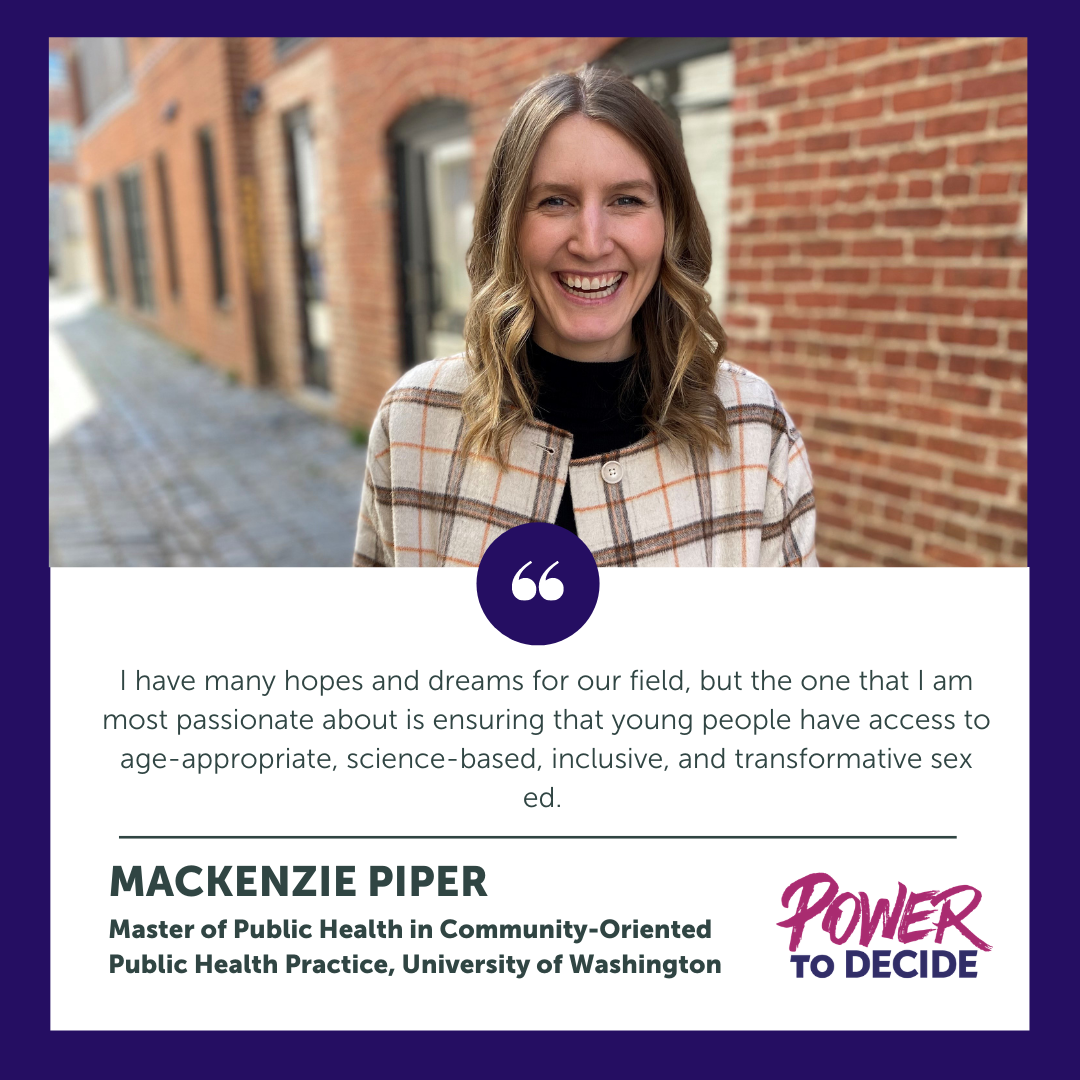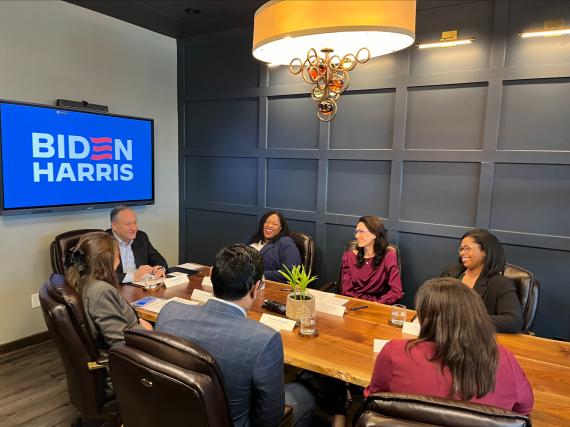Six Power to Decide Staffers on Why They Studied Public Health
From April 5-11, 2021, we recognize National Public Health Week, which this year encourages everyone to “Build Bridges to Better Health.” To honor this year’s theme, six members of Power to Decide’s staff discuss why they chose to enter the world of public health and what they want to see happen in the world of sexual and reproductive health in the near future in order to ensure better reproductive health for all.
Temilola Adeoye, Digital Health Fellow
Bachelor of Public and Community Health, Ithaca College
What led you to earn your degree in public health?
I decided to get my degree in public health, because I was always interested in health at the population level, but I did not have the vocabulary for it until I took an introductory public health course. While taking that course, I fell in love with public health as a vocation.
What is one change you want to see in the world of sexual and reproductive health in the next five years?
In the next five years, I would like to see the world of sexual and reproductive health become more inclusive and focus more on bringing LGBTQ+ and BIPOC people to the forefront, instead those people being considered as an afterthought.
Mackenzie Piper, Senior Manager, Programs
Master of Public Health in Community-Oriented Public Health Practice, University of Washington
What led you to earn your degree in public health?
I have always been drawn to “helping professions”, careers that value human connection and center empathy. Growing up I saw that lived out in doctors, nurses, and teachers. It wasn’t until I went to college that I even learned what a public health professional was. I came to understand that a career in public health would embody my values, but it would also require asking the hard and important questions, challenging the structures that keep people from living healthy and equitable lives, and thinking about innovative solutions to address them. Public health professionals are tasked with thinking big, while also having their ear to the needs of their community. I was attracted to a profession that would task me with going to the root of a problem, and asking “why is this happening and what can we do about it?”
What is one change you want to see in the world of sexual and reproductive health in the next five years?
I have many hopes and dreams for our field, but the one that I am most passionate about is ensuring that young people have access to age-appropriate, science-based, inclusive, and transformative sex ed. Right now, only 29 states and the District of Columbia have laws that mandate sex education, and in some, there’s no guarantee the information is high-quality or even medically accurate. Too many young people go without the sexual health information and access to the care they not only need but have a right to receive. It is my hope that as a nation, we can start to have a more honest conversation about how keeping honest, accurate, and important information from youth is actually harming their health.
Jennifer Johnsen, Vice President, Digital Programs and Education
Master of Public Health, Hunter College
What led you to earn your degree in public health?
I always knew I wanted to work in the health field and was studying in an undergraduate nursing program when I learned about public health. For me, it was thrilling to discover a field that combined my interests, including medicine, communications, behavioral science, sex education, and looked to not just cure disease but to consider given the social context of health and wellbeing, what can we do to create systems where people can thrive.
What is one change you want to see in the world of sexual and reproductive health in the next five years?
Picking just one is challenging because so many issues that relate to sexual health are interrelated. I would love to see us move the dial on improving health equity and reducing stigma around sexuality.
Samantha Berg, Policy Fellow
Master of Public Health, Columbia University
What led you to earn your degree in public health?
I decided to get an MPH because I wanted to work in the repro space. Between my personal journey with my own reproductive health and the organizing work I did during college, my passion for reproductive rights and justice grew. After working outside the field upon finishing my bachelor’s, I felt like getting a master’s degree was the next step, and an MPH made the most sense. I not only wanted to gain expertise of the subject matter but also build professional skills in the process. I also wanted to enroll in a program that would emphasize equity and intersectionality, since sexual and reproductive health don’t exist in a bubble. I’m thankful that my sexual and reproductive health coursework underscored this.
What is one change you want to see in the world of sexual and reproductive health in the next five years?
I want to see the field move away from the gender binary and women-centric language, recognizing that cis-women are not the only folks who need sexual and reproductive health services. I know the field is already moving in this direction, but there is still progress to be made. In the same vein, our field should strive to be more intersectional overall, looking to reproductive justice organizations for guidance and leadership. We need to commit to doing the work necessary to ensure our goals, values, and approaches are truly based on equity and justice.
JeNeen Anderson, Director Field Service
Master of Public Health, University of Albany/SUNY
What led you to earn your degree in public health?
Dr. Martin Luther King, Jr. once said, “Of all the forms of inequality, injustice in health care is the most shocking and inhumane.” Growing up unfortunately I witnessed this inhumanity in my community. This realization ignited a fire in me to want to create change and improve the health and well-being of marginalized communities.
What is one change you want to see in the world of sexual and reproductive health in the next five years?
In the next five years, I would like to see states taking a more proactive approach to achieving health equity in sexual and reproductive health by reducing health disparities that are often rooted in racial discrimination and systemic disenfranchisement through targeted policies and programs.
Gillian Sealy, Chief of Staff
PhD Health Science, Nova Southeastern University
Master Global Public Health, University of South Florida
What led you to earn your degree in public health?
From an early age I was interested in public health. My mother was a public health nurse who trained and worked in England and then relocated to the Caribbean to continue her public health career. Seeing her work in various public health arenas and in areas such as the HIV/AIDS crisis piqued my interest. As I learned more about the profession, one of the many things that attracted me to public health was the multi-faceted nature of this discipline. Public health is all around us—from the water coming out of our faucets, the sidewalks in our neighborhoods, to the food that we eat. Helping people understand how public health is an integral part of their lives also gave me the impetus to pursue a career in this field. As I spent more time in the field, it became even more important to me to work on issues where populations were often overlooked, where resources were not accessible, or where equity was not a top priority. This led to working in areas such as access to improved water and sanitation for affected populations in Rwanda and Malawi and on gender-based violence and school-based health and HIV de-stigmatization in the Caribbean. While the work can be daunting, it is absolutely rewarding. This is not a career where the people you help know your name or will walk up to say thanks but knowing you’ve had an impact on population’s health is exhilarating. There is a video that I often watch, to remind myself of why I do the work I do.
What is one change you want to see in the world of sexual and reproductive health in the next five years?
I would love to see a time when we don’t separate sexual and reproductive health from just plain health. They are all interconnected. Just as we don’t separate the need for people to seek out ophthalmology or podiatry from overall health, I would love to see a time when we treat sexual and reproductive health in the same vein. I would also love for people to see sexual and reproductive health as a state of complete well-being—physical, mental, and social. To achieve this means that access is essential. Whether that is access to accurate and resonant information, as well as safe, affordable, and effective methods of contraception or to services that enable people to have healthy pregnancies and safe deliveries.


